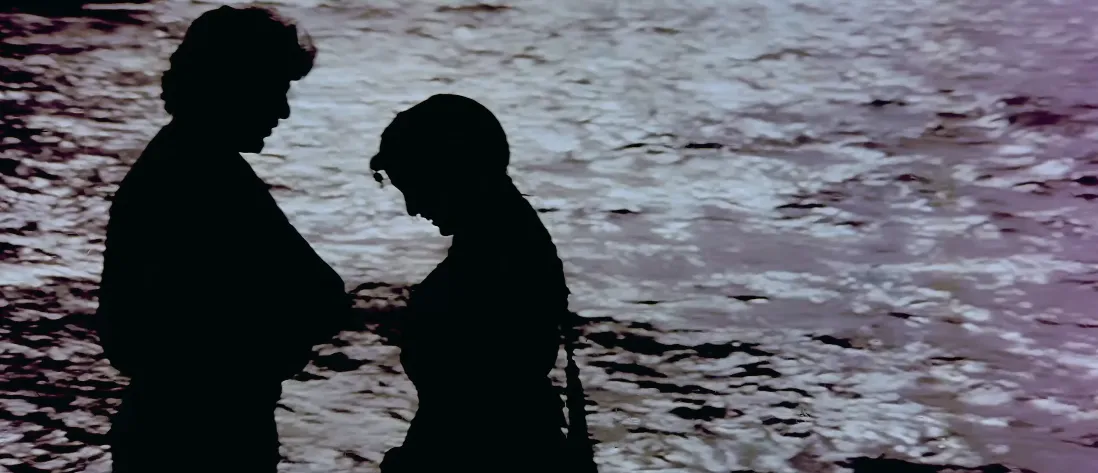பாசமுள்ள பாண்டியரு — அமரரின் அவப்பாடல்
There is something profoundly haunting in the choral wails that binds the very lines of the verses together. I cannot quite articulate it, but it is there. It comes from the depths of time itself—a whisper from the past. It is as though the very air hums with an ominous sorrow, carrying an unspoken grief—one that words alone cannot capture. You do not simply hear it; you feel it. It lingers. Something unsaid.
In fact, when the choral wails are stripped away, the song appropriates its celebratory air, joining the latter half of the verse—freer, brighter. Yet, when tethered, it loses that spark of liberation, sinking into something far less... unshackled. To my ears, it transforms into a lamenting lullaby, swaddled in melancholy, as though it sings not to uplift, but to mourn.
her.
நெத்தியில வட்டப்பொட்டு...
வச்சுக்கிட்டேன் இஷ்டப்பட்டு...
உத்தமி நான் சொக்கிக்கிட்டு...
வாங்கிக்கட்டு கூரப்பட்டு...

For Poongkodi, these marital emblems (வட்டப்பொட்டு, கூரப்பட்டு) are far from mere tradition; they are the very threads that bind her to Rajaraman—an intricate union, woven with the promise of the future. A future, both figurative and literal, quietly foreshadowed in the aftermath of their intimacy—a bond that stretches far beyond the physical realm.
And yet, the lyrics—rather than summoning words to represent the present moment—are conjugated in the past (...டேன், ...பட்டு, ...கிட்டு), as though time itself refuses to remain anchored in the now. It is within this turn in conjugation, this twist in syntax, that the true weight of the lovers' fate is not merely suggested, but sealed—hidden in plain sight, if you will. The future quietly slips away—almost unnoticed—into the shadow of one's memory. It feels as though what once promised a union of hope now irrevocably transforms into something lost—a fleeting moment, forever etched in the echoes of time. Paradoxical as it may seem, it is nothing more than the illusion of her wishful thinking.
him.
கட்டழகு பெட்டகமே...
பொட்டுவச்ச ரத்தினமே...
நித்திரைய விட்டுபுட்டு...
நேரமெல்லாம் சுத்துனமே...

For Rajaraman, unlike his lover's wishful feelings, his emotions are… a touch more obvious. There is no veil of subtlety, no lingering shadow of implication. His feelings are unapologetically exposed. His verse is not conjugated in reflection, but firmly anchored in the past. There is a confidence, if you will. An undeniable finality.
Words like 'நித்திரை' and 'நேரம்'—they are an unmistakable allusion to time itself. And yet, the words and conjugation chosen to describe the continuance (...விட்டுபுட்டு, ...சுத்துனமே)—do not simply evoke the passage of time, but rather a lost progression. An existence left stranded in the void. It alludes to a present he believed they were building toward, yet one that has never truly arrived.
The manner in which 'பெட்டகம்' and 'ரத்தினம்' are conjugated carries an unspoken fate. I do not interpret these words—or more specifically, the way they are conjugated (...மே)—as terms of endearment, but rather as a quiet impossibility, something we cannot prepare for, annexed to the endearment. I interpret them as: 'கட்டழகு பெட்டகமே, பொட்டுவச்ச ரத்தினமே... விதி நம்முறவை முறிக்கப்போவதை நீ இன்னும் உணரவில்லையா? உணர்ந்தும் நம்மிணைவை ஏங்கி பாடியாடி களிப்பதுவோ ஏனடி கண்மணியே?'
choral wails.
The ethereal choir, it seems, is ever so slightly proactive. A couple of measures, just a couple, before the main vocal enters. A purposeful delay, perhaps, but a delay that enhances the arrival of the voice that follows, adding depth and nuance to what’s to come. It’s in these moments, these quiet measures, that the true artistry reveals itself.
The voices, shifting in their masculine and feminine forms, dance together in a sort of tangled waltz. This exchange—subtle in its execution, yet powerful in its impact—creates forces, forces that shape the very contours of their relationship, forever tugging, forever pulling toward one another, yet never quite achieving the fullness of union.
They feel as though they are the paean of the guardians, the unseen sentinels of the afterlife. It carries within it the aching rhythm of a lullaby—but not for the living. No, this is a lullaby for the soul that has surrendered to the inevitable, and in surrender, has found solace in the embrace of something far more lasting than anything the world of flesh could offer.
One might imagine they are whispering, 'You have crossed the threshold; you have left the realm of the living. Welcome, weary lovers, to this quiet, eternal haven where no harm can reach you. Here, in this sanctuary of spirits, rest is your only reward. Rest in peace, for here, there are no battles to fight, no sorrow to bear.'
ballad of the spirits.
I’m not the one to articulate anything about the language of music, nor am I a scholar of its intricate symbols. But I can certainly recognize when a composition is crafted with care and intention, resonating far beyond mere notes and rhythms.
The song unfolds like a ballad between two lovers long dead—not lost to time, but their love, severed by a cruel force that tore their lives from the world. Their lives were stolen, and now, their love lingers in the air—neither certain nor whole, but a haunting ache, a wistful echo of what was taken far too soon.
I feel like these words could be inscribed on each other’s tombstone—cold, final, and immutable. Not merely marking the absence of their presence, but the weight of their shared non-existence. A tragic inevitability, written in the quietest of words.
judge for yourself.
To highlight the shift in tone, I have taken the liberty of isolating those very choral wails from the final mix. Now, I leave it to you—the listener, the reader—to experience the transformation and judge its merit for yourself.
Thanks for reading,
V.
p.s. A huge thank you to Diluckshan for his sharp musical feedback that cut through the noise, and to Siddharth, whose translation has lent clarity to the words.